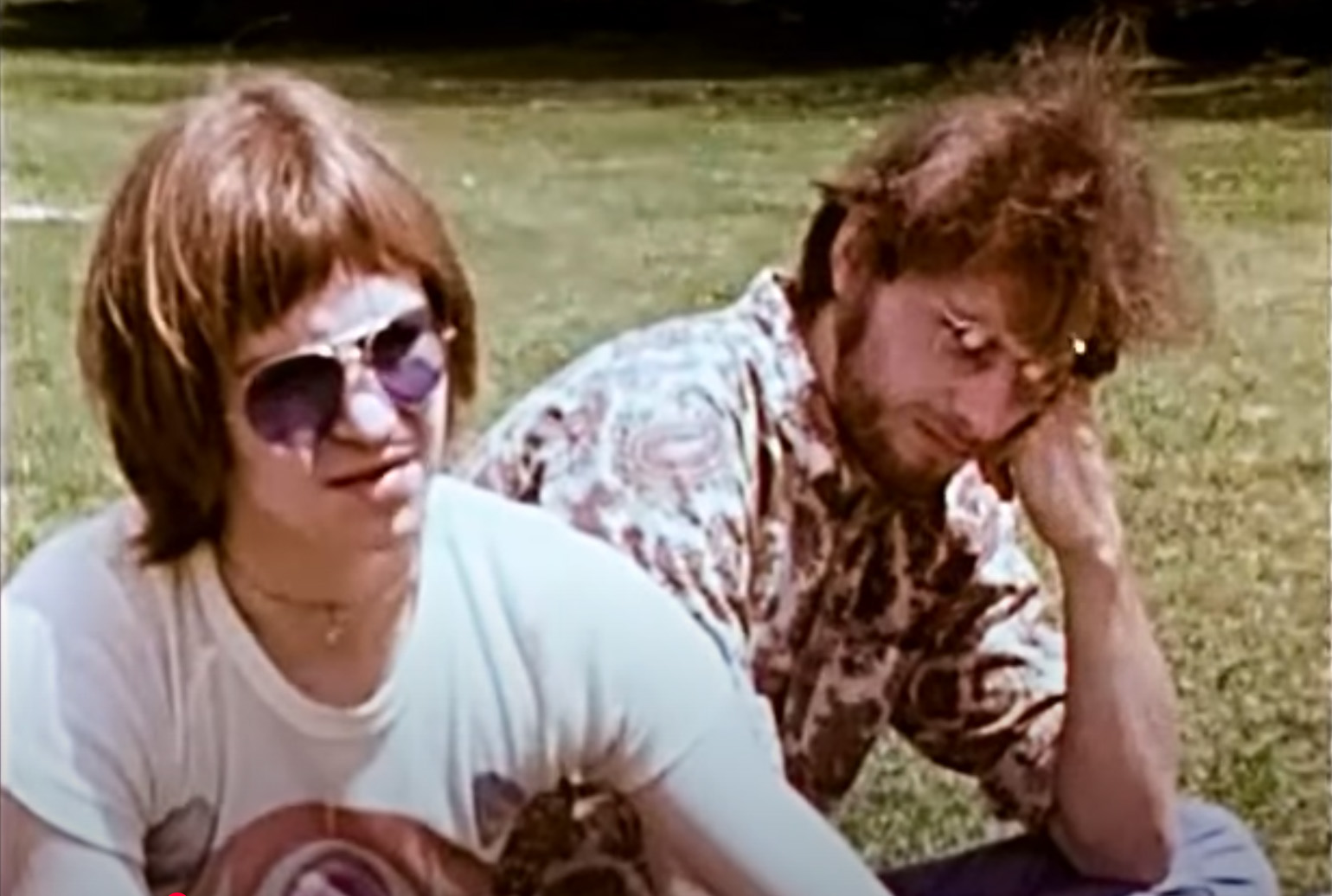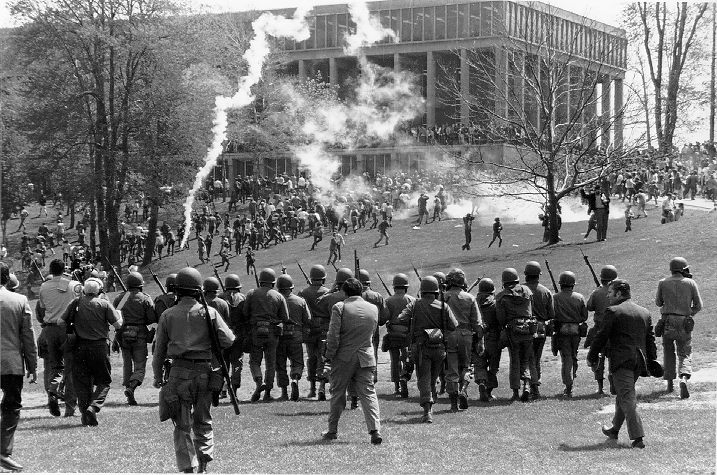WATCH 1970 Gerald Casale (DEVO) Interview As A Kent State Shooting Witness
In his first ever interview, the DIY punk & new wave icon discusses the national horror that would inform his art

The odds are that your social media feeds are overflowing with images of Mandalorians and Wookies today. A play on the phrase “may the force be with you,” the recognition of the term “May the Fourth” has been prevalent among fans almost as far back as the release of Episode IV: A New Hope back in 1977. However, the first real organized Star Wars Day celebration didn’t occur on this date until 2011 in Toronto, Canada. These days, May 4th is the informal commemorative day for the sci-fi franchise, with celebrations and promotions happening worldwide. Various events and gatherings are planned annually. Fortnite leans in particularly heavy with a Star Wars-themed battle pass and characters, along with returning light sabers to the game. Because of the almost comically tragic state of our country, the official White House Instagram even posted some nauseating AI-generated image of the trainwreck we have planted in the oval office rendered as a muscular Jedi (aptly, wielding a red saber), with a caption claiming that activists and the disenfranchised, somehow, actually the represent the empire. While most of the Star Wars hype seems like it is all in good fun, this celebration around a series of fictional space movies too often overshadows a very real and monumental tragedy that occurred in this country. Commonly referred to as the Kent State Massacre, Kent State Shootings, or May 4 Massacre, one of the most notorious and egregious violations of free speech perpetrated by the US government on student protestors took place 55 years ago today.
For those who are unaware of the event or could simply use a refresher, the Kent State Massacre took place on May 4th, 1970 at Kent State University, about 20 minutes outside of Akron, Ohio. Although Nixon‘s election as president in 1968 was partially based on his promise to bring an end to the Vietnam War, April 30th, 1970, found him announcing an expansion of the conflict with an invasion of Cambodia. This decision was met with protests against the continued aggression and in opposition to the draft. Over the next few days, such protests occurred at Kent State University, but by May 4th, much of what the students were protesting was the presence of the Ohio National Guard on their campus, who now believed the authority to control the crowds had been transferred to them and away from the college. From what I’ve read, some believe this was ordered by the Governor or even the University itself, while others claim they were never instructed to make their own calls at all. Some of these details are still murky. Where there does seem to be a consensus is that 28 of the more than 70 guardsmen fired their M1 rifles and pistols into a crowd of unarmed protestors, killing 4 and seriously injuring 9 others. It was calculated that between 61 and 67 shots were fired in a 13-second period. Although students Allison Krause (19) and Jeffrey Miller (20) were indeed protesting, the other 2 students killed weren’t even involved. Sandra Lee Scheuer (20) was an observer, at best, while William Schroeder (19) was simply going to class when he was shot in the back from 390 feet away. Another student named Dean Kahler was also shot in the small of his back and permanently paralyzed.

The Kent State shootings had an enormous ripple effect and a significant impact on US and world history. The pushback on the war only increased, along with a lack of public support for the US government. It has been calculated that over 4 million students participated in organized walk-outs at hundreds of universities, colleges, and high schools across the country. Another impact that the tragedy had was on art on music. Among those in attendance that day were Chryssie Hynde, Chris Butler, and Gerald Casale, who went on to form The Pretenders, The Waitresses, and DEVO, respectively. Hynde has discussed hearing the shots and claimed that her friend’s boyfriend was one of the victims. She ended up dropping out of school and moving to the UK. Butler, who has been cited as one of the people fired on during the event, was friends with Miller, as was Casale. Both have mentioned how the massacre led them to direct their energy into creative endeavors and helped drive a DIY ethos that would go on to inspire future generations. This was especially true in the case of DEVO, whose impact as a DIY art rock project, punk, and new wave innovators continues to influence and provide a blueprint for countless artists.
Casale co-founded DEVO with fellow survivor and witness Bob Lewis. Although the concept and particular musical elements began earlier, they evolved into an official band with the addition of Mark Mothersbaugh in 1973. While speaking about the shooting in a 2018 Washington Post interview, Casale stated, “I don’t think I would have started Devo had that not happened. It’s that simple.” Later in the piece, after describing the horrific scene of witnessing his friends Allison and Jeffrey being murdered, he adds, “I saw for the first time clearly, and horrifically, how everything really works, and how the truth doesn’t matter, and how things are rotten to the core.” Lewis, who was interviewed for the same article, explains, “We were pissed off, and we wanted to take the energy that comes from that anger and channel it, and it happened to be into the concept of Devo.” In another interview conducted by Kent State University, Casale states, “I had always been making art and music but the events of May 4th and beyond galvanized my creativity, infusing it with an existential anger and urgency that would otherwise not have happened. In short Devo and the idea of De-evolution as a manifesto would not exist without that defining historic trauma I experienced.”
Lewis would leave the project early on and Mothersbaugh would become the most recognizable figure in the group for those outside of the hardcore fanbase, but if you watch a lot of old interviews with the group, as I do, you’ll notice that Casale is often the one addressing reporters and elaborating on the concept of De-Evolution as a social commentary suggesting our collective regression as a culture and a species. One clip of Gerald that most people likely haven’t seen is a pre-DEVO interview conducted by the BBC in the wake of the May 4th Massacre. Filmed on the campus only two months after the event shook the nation, the video, which is considered Casale‘s first ever interview, only surfaced last year. The footage was posted to the DEVO YouTube account with a caption that speaks to the continued relevance of war, corruption, and oppression of free speech and student activism. Somehow, only a year later, this infringement on our constitutional rights is rapidly growing even more alarming.
You can read the caption below, followed by the interview in question.
This newly discovered film footage aired only once — in the year 1970, in Europe — and has never seen in the USA. But now it can be told! Jerry Casale explains:
“I remember participating in this BBC interview in July of 1970. I tried in vain to find out what happened with it in the ensuing years, resigned to thinking it had disappeared off the face of the earth without a trace.
Yellow taped-off Kent State University be damned, we were permitted on campus so the BBC could conduct the interview at the location known as ‘The Commons,’ which was the opening scene of the crime on May 4th, 1970.
I was selected for this interview because I was a member of SDS (Students for a Democratic Society) and I in the midst of the action that fateful day, 2 months prior to BBC’s film shoot. Two of the 4 students killed that day, Jeffery Miller and Alison Krause, were my friends.
It’s almost amusing now to see myself at age 22; a boy trying to be brave and figure things out. What’s not at all amusing is this interview gives evidence that the cultural warfare issues of Tyrannical Authoritarianism vs. Liberty and Democratic Rule of Law — which are front and center today — were in play over 50 yeas ago.
Some things never change. In fact, the stakes are much higher now given a world facing existential threats such as the collapse of the environment and the rise of AI. The good fight is eternal.“
—Gerald V. Casale